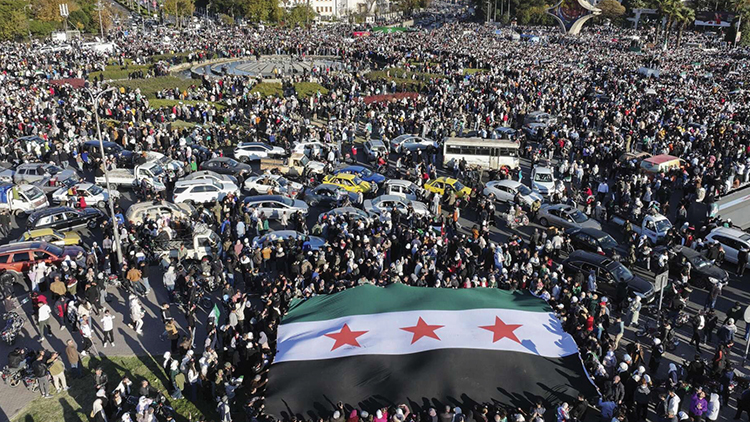The fall of Bashar al-Assad’s regime in Syria has ushered in a new era fraught with political, economic, and social challenges. The transition has reshaped the regional power dynamics and brought to the forefront critical questions surrounding governance, security, and the country’s reconstruction. As the nation grapples with the aftermath of the regime change, the energy sector emerges as a pivotal player that can address the country’s pressing needs and drive economic growth. The new administration has already issued its first tenders to purchase crude oil and refined products since the fall of Bashar al-Assad’s regime in December, as severe fuel shortages continue to cause prolonged blackouts across the country. This was made possible only after the U.S. waived sanctions that had previously prohibited energy trade with Syria. The waiver may open a new window for Syria to capitalize on its energy potential and work toward economic recovery.
Political Landscape
The removal of the Assad regime would likely result in a power vacuum, with various opposition groups, ethnic factions, and international actors vying for control. This could lead to a prolonged period of instability, much like what was seen in post-Saddam Iraq or post-Gaddafi Libya. The absence of a unified opposition and the presence of multiple militia groups could further complicate governance.
At the same time, this power shift has redrawn the political map, with Turkey emerging as a key player in shaping the future of post-Assad Syria. Iran, a former ally of the regime, has seen its influence wane, while Russia faces challenges in maintaining its geopolitical strategy in the region.
Additionally, Israel’s recent military expansion in Syria—beyond the Golan Heights, which it has controlled since 1967—is likely to heighten tensions with the new Syrian authorities. However, Al-Sharaa has sought to project a pragmatic and moderate image through cautious, restrained, and even somewhat positive statements about Israel in several media interviews.
Amidst these power struggles, the United States indicated that it will maintain its focus on combating ISIS and stabilizing Syria. The international community remains cautious about the rise of extremist groups and the potential for renewed conflict. As new alliances and rivalries take shape, the political landscape in Syria remains fluid, with regional actors vying for influence.
Economic Challenges
Syria’s economy has been decimated by years of civil war and sanctions, leading to a significant contraction in GDP and soaring poverty rates. The country, once self-sufficient in oil production, now relies heavily on energy imports from Russia and Iran. The loss of oil revenues has had a cascading effect on government finances, further exacerbating economic woes.
With millions of Syrians displaced internally and externally, resettling them and providing employment opportunities would be a daunting task. The war has left millions unemployed, and poverty levels have skyrocketed. A strong economic recovery plan, including job creation initiatives, microfinance programs, and vocational training, would be essential.
Estimates suggest that rebuilding Syria could cost hundreds of billions of dollars. Given the extent of the destruction, securing funding from international organizations such as the World Bank, IMF, and Gulf states would be crucial. However, securing these funds would require a stable and transparent governance system that can assure donors of the effective utilization of resources.
Role of the Energy Sector
However, Syria holds significant untapped potential in its oil and natural gas reserves, which could be leveraged to boost economic growth and generate much-needed revenue. With the right investments and infrastructure development, the energy sector has the capacity to fuel Syria’s reconstruction efforts and provide a lifeline for its struggling economy.
The energy sector also holds promise as a catalyst for addressing social needs, such as providing reliable electricity and heating for communities. Improved energy infrastructure can enhance living conditions, create job opportunities, and pave the way for sustainable development in post-conflict Syria.
Moreover, Syria’s strategic location as a transit state for regional gas trade opens up avenues for collaboration with neighboring countries like Turkey and Lebanon.
Turkey, in particular, has expressed interest in leading the reconstruction of Syria’s energy sector and leveraging energy exports to fund development projects. As Ankara seeks to establish economic partnerships with Syria, the energy sector emerges as a key area for cooperation and investment. Initiatives to enhance Syria’s electricity supplies and explore joint ventures in oil and gas exploration can have far-reaching benefits for both countries.
For many experts, the post-Assad era in Syria would be marked by significant challenges but also some of them see opportunities for rebuilding and progress. Politically, the country would need to navigate governance issues, power struggles, and international influences. Economically, the focus would have to be on rebuilding infrastructure, stabilizing the currency, and creating employment opportunities. Socially, addressing sectarian divides and ensuring justice would be vital for long-term peace.
The energy sector could serve as a cornerstone for economic revival, providing the necessary resources to rebuild the nation. By leveraging its natural resources wisely, attracting foreign investment, and ensuring transparent governance, Syria could lay the foundation for a more stable and prosperous future. However, the success of these efforts would depend on the ability of Syrian leaders and the international community to work together in ensuring a smooth and sustainable transition.







